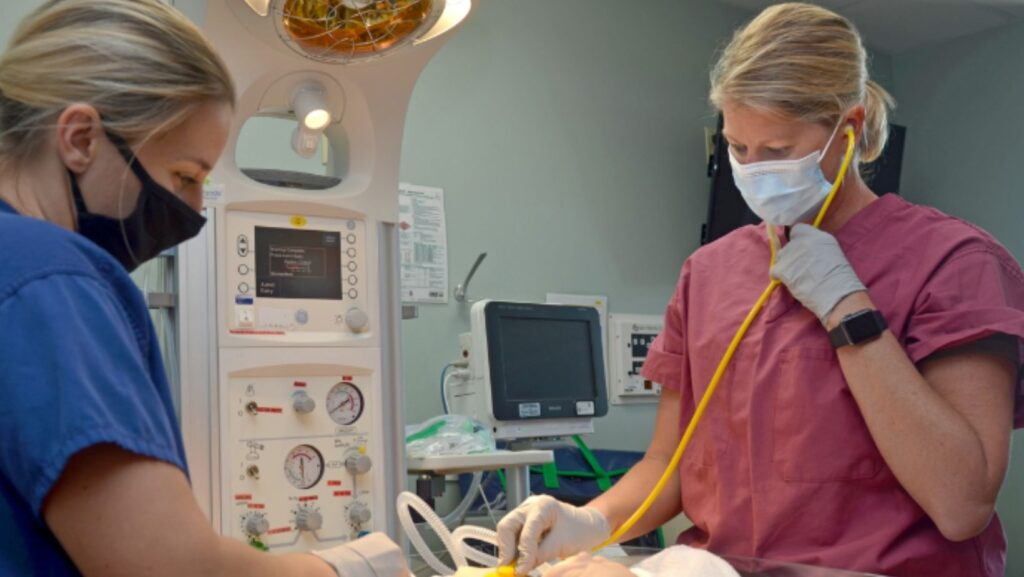Neonatal nursing is a rewarding career path for those passionate about the health of the newest additions to growing families: newborns. Neonates, or newborns within the first 28 days of life, have unique physiques and conditions that require specialized care. Neonatal nurses are vital in making sure these tiny patients receive the best possible start to life.
Neonatal nurses combine their specialized skill set with an empathetic approach to help support both newborns and their families during critical times. Their expertise can help treat the immediate needs of newborns and contribute to positive, long-term developmental outcomes.
https://www.rawpixel.com/image/3400355/free-image-doctor-and-nurse-university-cc0
What Does a Neonatal Nurse Do?
Neonatal nurses are registered nurses (RNs) who can work in well-baby hospital units or neonatal intensive care units (NICUs). Those in well-baby hospital units treat healthy newborn infants until they are discharged. Those in NICUs specialize in caring for neonates facing illnesses or complications such as congenital abnormalities, infections, physical defects, premature birth, and more. They can work closely with other healthcare professionals — such as pediatricians and pediatric surgical specialists — to ensure the best possible outcomes for their tiny patients.
In addition to providing direct patient care, neonatal nurses educate new parents on how to properly care for their newborns. They also provide emotional support to families during what can be a highly stressful and uncertain time.
A neonatal nurse’s responsibilities can vary depending on their work environment, which can be categorized into four levels.
Level One
Level one units — or well-baby units — are for newborns who typically don’t require special monitoring and are born between 35 and 37 weeks of gestation. Neonatal nurses working at this level provide routine care such as:
- performing hearing and vision tests
- giving shots
- bathing newborns
- teaching mothers how to care for their newborn
Even though these nurses primarily work with healthy newborns, they’re also trained in neonatal resuscitation.
Level Two
Neonatal nurses working at this level are often called NICU nurses because of their work environment. Level two units are designed to care for neonates born at 32 weeks or more of gestation and weigh more than 1,500 grams. They’re moderately ill but are anticipated to quickly improve with the appropriate support.

NICU nurses in level two units have the same skills as neonatal nurses in level one. However, they’ve undergone specialized training to administer intravenous fluids and medications, stabilize patients, provide non-invasive respiratory support, and more.
Level Three
Neonates in level three NICUs were born before 32 weeks of gestation. These premature patients require specialized care to keep them stable until they’re strong enough to breathe on their own or undergo surgery. NICU nurses in level three units are experts in caring for high-risk infants.
Level Four
Neonates in level four NICUs have complex conditions requiring major surgery. NICU nurses in level four units are trained to care for infants suffering from seizures, birth defects, organ failure, and more.
How To Begin a Neonatal Nursing Career
The first step to starting a nursing career is completing a postsecondary degree program.
Associate Degree in Nursing (ADN) programs and Associate of Science in Nursing (ASN) programs typically take around two years to complete. While this can help aspiring nurses quickly break into the workforce, most employers prefer RNs with bachelor’s degrees. Bachelor of Science in Nursing (BSN) programs take at least four years to complete but offer aspiring nurses more career opportunities, a higher salary, and greater room for career growth.
Berry College’s Nursing program provides students with cutting-edge training in high-fidelity simulation labs and over 650 clinical hours to build their skills and confidence. Through partnerships with the largest private medical clinic in Georgia and two local hospitals, Berry’s nursing students have access to numerous clinical, externship, and mentorship opportunities within two miles of the campus. This abundance of opportunity can help accelerate a graduate’s journey to becoming a neonatal nurse, as they need two years of experience caring for acute and critically ill neonates before they can pursue specialty certifications.

Both degree options prepare students to earn licensure by taking the National Council of Licensure Examination for Registered Nurses (NCLEX-RN). Notably, 100% of graduates from Berry’s Nursing program pass their NCLEX-RN exam and receive job offers prior to their pinning ceremony.
What Certifications Does a Neonatal Nurse Need?
Due to the unique physiology and health conditions that neonates face, neonatal nurses must undergo specialized training. As such, the certifications an aspiring neonatal nurse needs can vary based on their personal career goals and their employer. Neonatal nurses often hold certifications from agencies such as the American Association of Critical Care Nurses (AACN) and the National Certification Corporation (NCC).
Common certifications a neonatal nurse may hold include:
- Critical Care RN (Neonatal)
- Critical Care RN Knowledge Professional (Neonatal)
- Acute Care Clinical Nurse Specialist (Neonatal)
- Neonatal Intensive Care Nursing
- Inpatient Obstetric Nursing
- Maternal Newborn Nursing
- Low Risk Neonatal Intensive Care Nursing
It may not be necessary to hold all of these certifications. Aspiring neonatal nurses should check the requirements of their desired position before deciding which certification exam to take.
How Long Does It Take to Become a Neonatal Nurse?
The time it takes to become a neonatal nurse can vary based on program length, how long it takes to gain appropriate experience, and how many certifications they obtain. Generally speaking, it can take from four to six years:
- two to four years to earn a postsecondary degree
- two years to gain experience
https://www.pexels.com/photo/unrecognizable-obstetrician-and-nurse-carrying-newborn-baby-trolley-in-hospital-4006979/
Becoming a neonatal nurse is a rewarding journey that requires dedication and the right education. With four distinct levels of care in neonatal units, this specialty offers a unique opportunity to make a significant impact on the lives of vulnerable neonates and their families. Each milestone along your path — earning your degree, licensure, experience, and specialty certifications — enhances your skills and brings you one step closer to making significant impacts in the neonatal field.
Embrace each challenge you encounter along the way as an opportunity for growth and empowerment. With the right combination of education, experience, and passion, you can become a skilled and compassionate neonatal nurse who makes a difference in the world every day.
